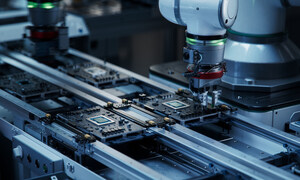
- Catapult AI NN offers software engineers a comprehensive solution to synthesize AI Neural Nets
- Enables software development teams to seamlessly translate AI models designed in Python into silicon-based implementations, facilitating faster and more power-efficient execution compared to standard processors
PLANO, Texas, May 21, 2024 /PRNewswire/ -- Siemens Digital Industries Software today announced Catapult™ AI NN software for High-Level Synthesis (HLS) of neural network accelerators on Application-Specific Integrated Circuits (ASICs) and System-on-a-chip (SoCs). Catapult AI NN is a complete solution that starts with a neural network description from an AI framework, converts it into C++ and synthesizes it into an RTL accelerator in Verilog or VHDL for implementation in silicon.
Catapult AI NN brings together hls4ml, an open-source package for machine learning hardware acceleration, and Siemens' Catapult™ HLS software for High-Level Synthesis. Developed in close collaboration with Fermilab, a U.S. Department of Energy Laboratory, and other leading contributors to hls4ml, Catapult AI NN addresses the unique requirements of machine learning accelerator design for power, performance, and area on custom silicon.
"The handoff process and manual conversion of a neural network model into a hardware implementation is very inefficient, time consuming and error-prone, especially when it comes to creating and verifying variants of a hardware accelerator tailored to specific performance, power and area," said Mo Movahed, Vice President and General Manager for High-Level Design, Verification and Power, Siemens Digital Industries Software. "By empowering scientists and AI experts to leverage industry-standard AI frameworks, such as neural network model design, and by seamlessly synthesizing these models into hardware designs optimized for power, performance, and area (PPA), we're opening a whole new realm of possibilities for AI and machine learning software engineers. Our new Catapult AI NN solution allows developers to automate and implement their neural network models for optimal PPA concurrently during the software development process, ushering in a new era of efficiency and innovation in AI development."
As runtime AI and machine learning tasks migrate from the datacenter into everything from consumer appliances to medical devices, there is a rapidly growing requirement for "right-sized" AI hardware to minimize power consumption, lower cost and maximize end-product differentiation. However, most machine learning experts are more comfortable working with tools such as TensorFlow, PyTorch or Keras, rather than synthesizable C++, Verilog or VHDL. There has traditionally been no easy path for AI experts to accelerate their machine learning applications in a right-sized ASIC or SoC implementation.
The hls4ml initiative is intended to help bridge this gap by generating C++ from a neural network described in AI frameworks such as TensorFlow, PyTorch or Keras. The C++ can then be deployed for an FPGA, ASIC or SoC implementation.
Catapult AI NN extends the capabilities of hls4ml to ASIC and SoC design. It includes a dedicated library of specialized C++ machine learning functions that are tailored to ASIC design. Using these functions, designers can optimize PPA by making latency and resource trade-offs across alternative implementations from the C++ code. Moreover, designers can now evaluate the impact of different neural net designs to determine the best neural network structure for hardware.
"Particle detector applications have extremely stringent edge AI constraints," said Panagiotis Spentzouris, Fermilab Associate Lab Director for Emerging Technologies. "Through our collaboration with Siemens, we were able to develop Catapult AI NN, a synthesis framework that leverages the expertise of our scientists and AI experts without requiring them to become ASIC designers. Moreover, this powerful new framework is also ideal for seasoned hardware experts."
Catapult AI NN is available for early adopters now and will be available to all users in the fourth quarter of 2024. To learn more about Catapult AI NN, visit https://eda.sw.siemens.com/en-US/ic/catapult-high-level-synthesis/hls/ai-solutions/
Siemens Digital Industries Software helps organizations of all sizes digitally transform using software, hardware and services from the Siemens Xcelerator business platform. Siemens' software and the comprehensive digital twin enable companies to optimize their design, engineering and manufacturing processes to turn today's ideas into the sustainable products of the future. From chips to entire systems, from product to process, across all industries. Siemens Digital Industries Software – Accelerating transformation.
Siemens Digital Industries (DI) is an innovation leader in automation and digitalization. Closely collaborating with partners and customers, DI drives the digital transformation in the process and discrete industries. With its Digital Enterprise portfolio, DI provides companies of all sizes with an end-to-end set of products, solutions and services to integrate and digitalize the entire value chain. Optimized for the specific needs of each industry, DI's unique portfolio supports customers to achieve greater productivity and flexibility. DI is constantly adding innovations to its portfolio to integrate cutting-edge future technologies. Siemens Digital Industries has its global headquarters in Nuremberg, Germany, and has around 72,000 employees internationally.
Siemens AG (Berlin and Munich) is a leading technology company focused on industry, infrastructure, transport, and healthcare. From more resource-efficient factories, resilient supply chains, and smarter buildings and grids, to cleaner and more comfortable transportation as well as advanced healthcare, the company creates technology with purpose adding real value for customers. By combining the real and the digital worlds, Siemens empowers its customers to transform their industries and markets, helping them to transform the everyday for billions of people.
In fiscal 2023, which ended on September 30, 2023, the Siemens Group generated revenue of €77.8 billion and net income of €8.5 billion. As of September 30, 2023, the company employed around 320,000 people worldwide. Further information is available on the Internet at www.siemens.com.
Note: A list of relevant Siemens trademarks can be found here. Other trademarks belong to their respective owners
SOURCE Siemens Industry Software






Share this article